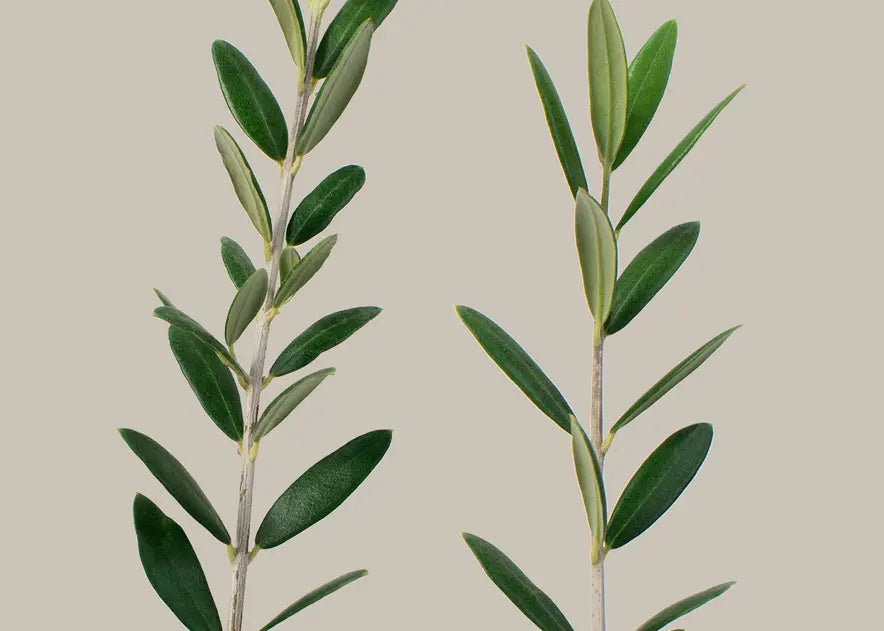
Plants 101
How to Care for an Olive Tree
Learn how to create the best growing conditions for the common Olive tree.

Olive trees, scientifically known as Olea europaea, have a rich history dating back thousands of years. They are native to the Mediterranean region, specifically in areas such as Greece, Italy, Spain, and parts of the Middle East.
Olive trees have played a significant role in the cultures and economies of these regions, providing not only nourishing fruits but also oil for cooking, cosmetics, and religious rituals. These evergreen trees have leathery, silver-green leaves and gnarled trunks that can withstand drought and harsh conditions.
Olive trees have become symbols of peace, wisdom, and longevity, and their cultivation has spread to various parts of the world with suitable climates Here's what you need to know to keep your olive tree healthy and happy indoors:

Sunlight
Olive trees prefer full sun, so make sure to place your tree in a spot that gets at least six hours of direct sunlight per day. They will thrive the best indoors in an unobstructed South or West window, but smaller specimens can tolerate Eastern light. Avoid placing your Olive trees in North windows since it only provides a low to moderate indirect light for plants.
Not sure if your space will provide enough light? Consider measuring light to ensure your Olive tree will receive enough. If you find your space doesn't provide enough light then consider installing a grow light to keep over the plant for 10-12 hours a day.
Water
Olive trees are drought-tolerant and can be sensitive to overwatering. Allow at least half the soil to dry out between waterings, and make sure to provide good drainage. You can utilize a moisture meter to help you properly gauage soil moisture and avoid overwatering!
Humidity
Olive trees will grow well in low to moderate humidity levels and can tolerate dry air. Not sure if humidity is high enough? You can measure the level of humidity with a hygrometer or LTH meter.
Temperature
Olive trees can tolerate a wide range of temperatures, but prefer temperatures between 50-85°F (10-29°C). That said, a mature established tree can survive temperatures down to 15°F for a limited time.
Soil
Olive trees will do well in a well-draining potting mix , such as a mix of pine bark, perlite, and compost. Olive trees can also grow well in rocky or gravelly soil but regular fertilizing would be required to make up for the lack of organic material.
Fruit
An olive tree typically begins producing its first fruit after a 2-3 years of maturity and growth. However, the exact timing can vary depending on various factors, including the olive tree variety, climate, soil conditions, and care provided.
During the first few years, the olive tree focuses on establishing a strong root system and developing its trunk and branches. Once the tree reaches maturity, it enters the fruit-bearing phase. This phase is influenced by factors such as sunlight exposure, temperature, pollination, and pruning techniques.
It's important to note that while olive trees may produce a few fruits in their early years, significant yields are typically observed after the tree reaches full maturity, which can take up to 15 years. Patience and proper care are essential to ensure a healthy and productive olive tree in the long run!
Common Problems
While olive trees are relatively hardy, they can still experience some common issues. Here are some symptoms and causes to look out for:
SYMPTOM: Leaf drop, moist potting mix
CAUSE: Not enough light
SYMPTOM: Yellowing and leaf drop, wet potting mix
CAUSE: Overwatered
SYMPTOM: Leaf drop, dry potting mix
CAUSE: Underwatered
SYMPTOM: Fruit drop
CAUSE: Underwatered, lack of nutrients
Precautions
Olive trees are generally safe to grow in the home, but the leaves and fruit contain a substance called oleuropein, which can be toxic to pets if ingested in large quantities. Keep them out of reach of children and pets.
By following these tips and taking the necessary precautions, you can enjoy the beauty and fruit of an olive tree in your home.

Words By The Sill
Empowering all people to be plant people—a collection of articles from The Sill's team of plant experts across a variety of plant care topics to inspire confidence in the next generation of plant parents. Welcome to Plant Parenthood™.
Do Some Plant Shopping